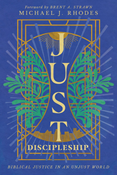
We have seen progress in recent decades toward Martin Luther King Jr.'s dream of beloved community. But this is not only because of the activism and sacrifice of a generation of civil rights leaders. It happened because God was on the move.
Historian and theologian Charles Marsh partners with veteran activist John Perkins to chronicle God's vision for a more equitable and just world. Perkins reflects on his long ministry and identifies key themes and lessons he has learned, and Marsh highlights the legacy of Perkins's work in American society. Together they show how abandoned places are being restored, divisions are being reconciled, and what individuals and communities are doing now to welcome peace and justice.
Now updated to reflect on current social realities, this book reveals ongoing lessons for the continuing struggle for a just society. Come, discover your part in the beloved community. There is unfinished work still to do.
"For years, John Perkins and Charles Marsh have been two of our most important figures in the discussion—and pursuit—of reconciliation. Now, from their passion for justice, their love of the gospel, and their friendship with one another, comes this gem, which may be the most important book either of them has written yet."
"Growing up in a Korean American immigrant church context, I did not hear the name John Perkins all that often. Since those early years, I have made a concerted effort to learn as much as possible about the work of one of the most important American Christian voices of the twentieth and twenty-first centuries. This book provides important insights into the life, testimony, theology and ministry of John Perkins. It is both a work of inspiration and a work of history (reflecting the leanings of the dual authors) that must be read by any student or practitioner of social justice ministry. The book provides novices, faithful servants and even the weary laborers the inspiration to persevere in God's kingdom work. John Perkins and Charles Marsh provide for us a view of compassion, mercy, and justice ministry that needs to be heeded in the context of a new evangelicalism in North America."
"Welcoming Justice represents the perfect marriage of social justice and scholarly reflection. Far too often, those endeavors are not connected, leaving either effort impoverished. Everyone interested in thoughtful and just social change will find this book richly rewarding."
"The blood that runs through the veins of our nation is a muddy river; its waters are deep with honor and shame, joy and pain, compassion and exploitation. Charles Marsh and John Perkins are incredible navigators in the murky waters of race and reconciliation. To see the past, present, and future of 'the dream' of the beloved community through the eyes of Perkins and Marsh is to see a resurrection of hope. These are two men who live out the ideas they speak about with eloquence and beauty. If words are the scaffolding we build our lives on, this book lays a true and elegant foundation."
"For decades John Perkins's footsteps have been leading people out of captivity, like Moses. And Charles Marsh has been tracking those footsteps with the eye of a historian, showing us that this liberation journey is an ancient one, and it ain't over yet . . . It did not end with Moses or with Dr. King, nor will it end with John Perkins. In Welcoming Justice, Perkins and Marsh have created a perfect harmony, a freedom song that will echo with hope through the streets of injustice and the halls of academia, inviting everyone who hears to take a step out of the empire in which we live and to move one step closer to the Promised Land, the beloved community of God."
"Together, Perkins and Marsh are attempting to restore the vision, both conceptually and practically, showing how theology can indeed be lived out in a multicultural society despite its deeply stained past. I know of no better time to attempt such a project, and no team better equipped to accomplish it."
CONTENTS
Foreword to the First Edition
Preface to the Expanded Edition
1 The Unfinished Business of the Civil Rights Movement
2 The Cultural Captivity of the Church
3 The Power of True Conversion
4 The Next Great Awakening
5 God's Movement in the Twenty-First Century
6 A Time for Rebuilding
Afterword
Acknowledgments
Study Guide
Suggested Reading
Notes














